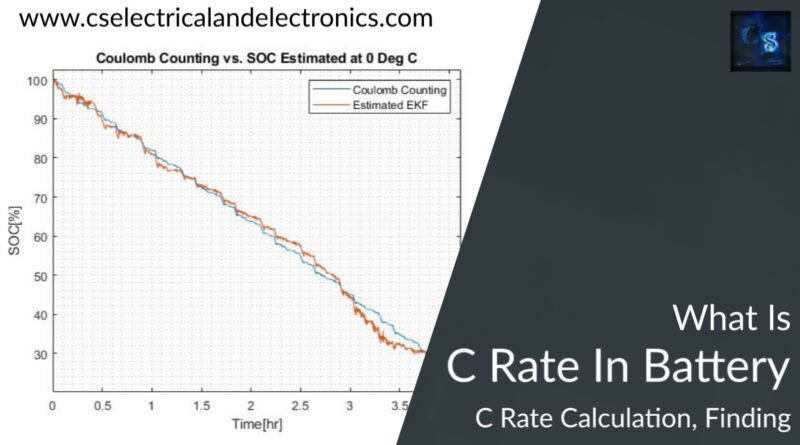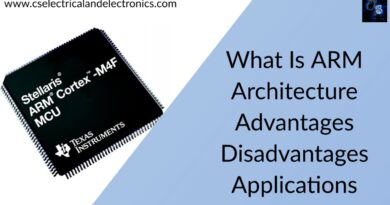What Is C Rate In Battery, Why It Is Important, C Rate Calculation
Hello guys, welcome back to my blog. In this article, I will discuss what is C rate in battery is, why it is important, the C rate calculation in a battery, and what is E rate in the battery is. battery specification.
If you have any electrical, electronics, and computer science doubts, then ask questions. You can also catch us on Instagram – CS Electrical & Electronics.
Also, read the following:
- Fuel Cell Working, Applications, Types, Advantages, Disadvantages
- SoC Estimation Using Extended Kalman Filter In MATLAB Simulink
- Top 10 Battery Management System Projects In Simulink
What Is C Rate In Battery
Hybrid and electric vehicles include a high-voltage battery pack that consists of separate modules and cells arranged in series and parallel. A cell is the smallest packaged form, a battery can handle, and is typically on the order of one to six volts. A module consists of several cells commonly connected in either series or parallel. A battery pack is then created by connecting modules together, also either in series or parallel.
In explaining batteries, the discharge current is often described as a C-rate in order to standardize battery capacity, which is usually very diverse between batteries. A C-rate is a measurement of the rate at which a battery is discharged comparable to its full capacity. A 1C rate indicates that the discharge current will discharge the whole battery in 1 hour.
For a battery with a capacity of 100 Ah, this correlates to a discharge of 100 Amps of current. A 5C rate for this battery will be 500 Amps, and a C/2 rate will be 50 Amps. Likewise, an E-rate represents the discharge power. A 1E rate is the discharge power to discharge the whole battery in 1 hour.
Applications that need a C rate of battery
There are an increasing number of applications and gadgets on the market that need a greater C Rate discharged battery. These contain industrial and customer applications like robotics, RC models, drones, and vehicle jump starters. All these applications need a powerful energy blast in a short period of time.
A battery’s charge and discharge rates are managed by battery C Rates. The battery C rating is the measurement of the current at which a battery is charged and discharged. The capacity of a battery is generally rated and labeled at the 1C Rate (1C current), this means a fully charged battery with a capacity of 10Ah should be able to provide 10 Amps for one hour. That same 10Ah battery being discharged at a C Rating of 0.5C will provide 5 Amps over two hours, and if discharged at a 2C Rate it will provide 20Amps for 30 minutes. The C rating of a battery is important to know as with the majority of batteries the available stored energy relies on the speed of the charge and discharge currents.
C rate for different hours
| C Ratings | Time |
| 30 C rate | 2 minutes |
| 20 C rate | 3 minutes |
| 10 C rate | 6 minutes |
| 5 C rate | 12 minutes |
| 2 C rate | 30 minutes |
| 1 C rate | 1 hour |
| 0.5 C rate or C/2 | 2 hours |
| 0.2 C rate or C/5 | 5 hours |
| 0.1 C rate or C/10 | 10 hours |
| 0.05 C rate or C/20 | 20 hours |
The above chart illustrates the various battery C Rates along with their assistance times. It is necessary to know that actually though discharging a battery at various C Rates should utilize the same calculations as a similar amount of energy, in fact, there are probably to be some inner energy losses. At higher C Rates some of the power (energy) can be lost and turned into heat which can result in reducing the capacity by 5% or more.
To obtain a politely good capacity reading, manufactories generally rate alkaline and lead-acid batteries at an extremely low 0.05C or a 20-hour discharge. Actually at this slow discharge rate, lead-acid rarely achieve a 100 percent capacity as the batteries are overrated. Manufactories deliver capacity offsets to adjust for the differences if discharged at a higher C rate than specified.
How to find the C rating of the battery?
Smaller batteries are typically rated at the 1C rating, which is also understood as the one-hour rate. For instance, if your battery is marked 3000mAh at the one-hour rate, then the 1C rating means 3000mAh. You will normally find the C rate of your battery on its title and on the datasheet of the battery. Various battery chemistries will occasionally display various C rates, for example, lead-acid batteries are typically rated at a very lower discharge rate usually 0.05C, or a 20-hour rate.
The chemistry and structure of your battery will decide the highest C rate of your battery, lithium batteries for example can tolerate vastly higher discharging C Rates than different chemistries such as alkaline. If you cannot see the battery C rating on the title or datasheet we recommend reaching the battery manufacturer instantly.
How to estimate the C rate of the battery or cell
A battery’s C Rating is specified by the rate of the period in which it carries to charge or discharge. You can raise or decrease the C Rate and as a result, this will impact the period it takes the battery to discharge or charge. The C Rate discharge or charge time shifts in respect to the rating. 1C is equivalent to 60 minutes, 0.5C to 120 minutes, a 2C rating is equivalent to 30 minutes, and just things you can read from the above table.
The formula is easy,
- t = Time
- Cr = C Rate
- t = 1 / Cr (to view in hours)
- t = 60 minutes / Cr (to view in minutes)
30C Rate Example
- 2300mAh Battery
- 2300mAh / 1000 = 2.3A
- 30C x 2.3A = 69A available
- 60 / 30C = 2 minutes
2C Rate Example
- 2300mAh Battery
- 2300mAh / 1000 = 2.3A
- 2C x 2.3A = 4.6A available
- 1 / 2C = 0.5 hours
- 60 / 2C = 30 minutes
0.5C Rate Example
- 2300mAh Battery
- 2300mAh / 1000 = 2.3A
- 0.5C x 2.3A = 1.15A available
- 1 / 0.5C = 2 hours
- 60 / 0.5C = 120 minutes
How to calculate the output current, power, and energy of a battery based on its C rating
- Er = Rated energy (Ah)
- Cr = C Rate
- I = Current of charge or discharge (Amps)
- I = Cr * Er
- Cr = I / Er
This was about “What Is C Rate In Battery“. I hope this article may help you all a lot. Thank you for reading.
Also, read:
- 10 Tips To Maintain Battery For Long Life, Battery Maintainance
- 10 Tips To Save Electricity Bills, Save Money By Saving Electricity
- 100 (AI) Artificial Intelligence Applications In The Automotive Industry
- 100 + Electrical Engineering Projects For Students, Engineers
- 1000+ Control System Quiz, Top MCQ On Control System
- 1000+ Electrical Machines Quiz, Top MCQs On Electrical Machines
- 1000+ MATLAB Simulink Projects For MTech, Engineering Students
- 50 Tips To Save Electricity At Home, Shop, Industry, Office
Author Profile
- Chetu
- Interest's ~ Engineering | Entrepreneurship | Politics | History | Travelling | Content Writing | Technology | Cooking
Latest entries
 All PostsApril 19, 2024What Is Vector CANoe Tool, Why It Is Used In The Automotive Industry
All PostsApril 19, 2024What Is Vector CANoe Tool, Why It Is Used In The Automotive Industry All PostsApril 13, 2024What Is TCM, Transmission Control Module, Working, Purpose,
All PostsApril 13, 2024What Is TCM, Transmission Control Module, Working, Purpose, All PostsApril 12, 2024Top 100 HiL hardware in loop Interview Questions With Answers For Engineers
All PostsApril 12, 2024Top 100 HiL hardware in loop Interview Questions With Answers For Engineers All PostsMarch 22, 2024Driver Monitoring Systems In Vehicles, Working, Driver Sleepy Alert
All PostsMarch 22, 2024Driver Monitoring Systems In Vehicles, Working, Driver Sleepy Alert








